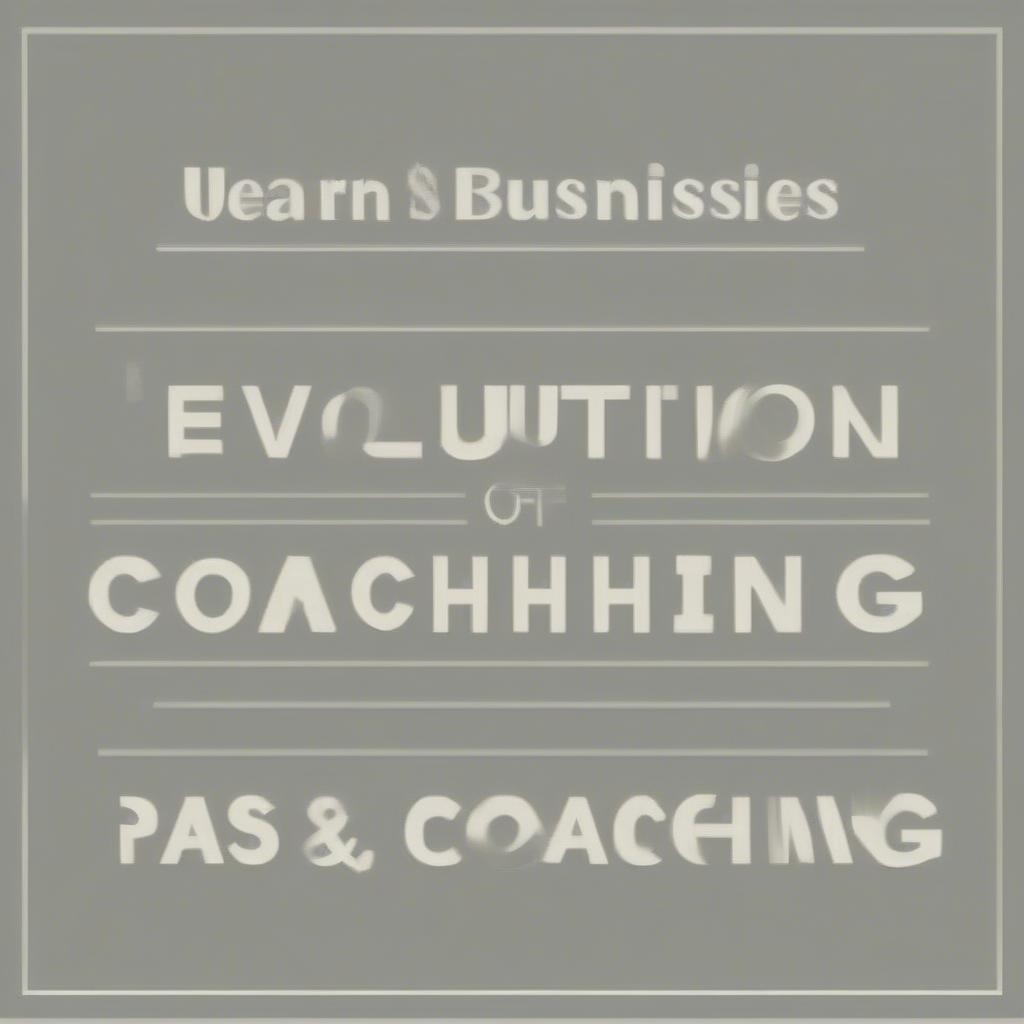
Your coaching business isn’t just a job; it’s your passion, your purpose, and a vehicle for helping others achieve their dreams. But like any vehicle, it needs a clear destination and a roadmap to get there. That’s where long-term goals come in. This article dives deep into how to set long-term goals for your coaching business, providing actionable strategies, examples, and templates to guide you on your journey to success. We’ll cover everything from understanding the “why” behind your goals to the practical steps you can take to achieve them. Let’s embark on this journey together!
Why Long-Term Planning is Crucial for Your Coaching Business
Why even bother with long-term planning? The answer is simple: survival and thriving. Without a long-term vision, your coaching business is like a ship without a rudder, drifting aimlessly on the sea of competition.
The Pitfalls of Short-Sightedness
Focusing solely on short-term gains can lead to:
- Burnout: Constantly chasing immediate revenue without a larger purpose can drain your energy and enthusiasm.
- Missed Opportunities: Failing to anticipate market trends and adapt accordingly can leave you behind.
- Lack of Direction: Without a clear vision, your business can become scattered and ineffective.
- Stagnation: Short-term goals often focus on maintaining the status quo, hindering growth and innovation.
- Reactive Decision-Making: Reacting to immediate crises instead of proactively shaping your business’s future.
Benefits of Long-Term Business Goals
Setting long-term business goals provides a multitude of benefits:
- Clarity and Focus: Knowing where you want to be in 3, 5, or 10 years provides a clear direction for your efforts.
- Motivation and Inspiration: A compelling long-term vision can fuel your passion and drive you through challenging times.
- Strategic Decision-Making: Long-term goals provide a framework for making informed decisions about resource allocation, marketing, and service development.
- Proactive Adaptation: Anticipating future trends and adapting your business model accordingly gives you a competitive edge.
- Sustainable Growth: Focusing on long-term value creation ensures the longevity and stability of your coaching business.
- Enhanced Reputation: Achieving ambitious goals builds credibility and positions you as a leader in your niche.
Understanding Your “Why”: Defining Your Coaching Business Vision
Before diving into specific goals, you need to understand your “why.” This is the core purpose that drives your coaching business. What impact do you want to make on the world? What values guide your decisions?
Unearthing Your Core Values
Your core values are the fundamental beliefs that guide your behavior. Identifying them is crucial for aligning your business with your personal values.
- Exercise: Brainstorm a list of values that resonate with you (e.g., integrity, compassion, innovation, excellence, growth).
- Prioritize: Narrow down your list to 3-5 core values that are most important to you.
- Define: Define what each value means to you in the context of your coaching business.
- Example: If “Integrity” is a core value, it might mean being honest and transparent with clients, even when it’s difficult.
Crafting Your Coaching Business Mission Statement
Your mission statement is a concise declaration of your business’s purpose. It should answer the questions: What do you do? Who do you serve? How do you do it?
- Example: “To empower individuals to achieve their full potential through personalized coaching and transformative strategies.”
- Template: “To [action verb] [target audience] by [unique offering/approach] so that [desired outcome].”
Visualizing Your Ideal Coaching Business Future
Imagine your coaching business 5, 10, or even 20 years from now. What does it look like? What are you doing? Who are you serving?
- Exercise: Write a detailed description of your ideal future coaching business. Include details about your services, clients, team, impact, and lifestyle.
- Benefits: This exercise can help you identify your deepest desires and aspirations for your business.
Setting SMART Coaching Business Goals
Once you have a clear understanding of your “why,” you can start setting SMART goals. SMART stands for:
- Specific: Clearly defined and unambiguous.
- Measurable: Quantifiable and trackable.
- Achievable: Realistic and attainable.
- Relevant: Aligned with your overall vision and values.
- Time-bound: With a defined deadline.
Examples of SMART Long-Term Business Goals for Coaches
Here are some examples of SMART long-term goals for different aspects of your coaching business:
- Financial: “Increase annual revenue by 20% year-over-year for the next 5 years by attracting and retaining high-value clients and expanding service offerings.”
- Client Acquisition: “Attract 100 new ideal clients per year for the next 3 years through targeted online marketing campaigns and strategic partnerships.”
- Brand Building: “Become a recognized thought leader in my niche within 5 years by publishing a book, speaking at industry events, and building a strong online presence.”
- Service Development: “Develop and launch 3 new coaching programs within the next 2 years to cater to the evolving needs of my target audience.”
- Team Building: “Build a team of 5 highly skilled coaches within the next 3 years to expand service capacity and reach a wider audience.”
Templates for Writing SMART Goals
Use these templates to create your own SMART goals:
- Template 1: “I will [action verb] [what] by [when] so that [why/benefit], as measured by [metric].”
- Template 2: “By [date], I will achieve [specific outcome] by [how] which will contribute to [overall business goal].”
Identifying Key Performance Indicators (KPIs) to Track Progress
KPIs are measurable values that demonstrate how effectively you are achieving your key business objectives.
- Examples: Revenue, number of clients, website traffic, social media engagement, client satisfaction scores.
- Tools: Use spreadsheets, project management software, or CRM systems to track your KPIs.
Developing Strategies to Achieve Your Coaching Business Goals
Setting goals is only the first step. You need to develop strategies to achieve them.
Marketing Strategies for Attracting Ideal Clients
- Content Marketing: Create valuable content (blog posts, articles, videos, podcasts) that attracts your target audience.
- Social Media Marketing: Build a strong presence on social media platforms where your ideal clients hang out.
- Email Marketing: Build an email list and nurture your subscribers with valuable content and offers.
- Search Engine Optimization (SEO): Optimize your website and content for search engines to attract organic traffic.
- Paid Advertising: Use paid advertising (e.g., Google Ads, Facebook Ads) to reach a wider audience.
- Networking: Attend industry events and connect with potential clients and partners.
- Referral Marketing: Encourage satisfied clients to refer new clients to your business.
Sales Strategies for Converting Leads into Clients
- Qualify Leads: Identify leads that are a good fit for your coaching services.
- Build Rapport: Establish a strong relationship with potential clients.
- Understand Needs: Ask questions to understand their challenges and goals.
- Present Solutions: Explain how your coaching services can help them achieve their desired outcomes.
- Handle Objections: Address any concerns or objections they may have.
- Close the Sale: Ask for the business and make it easy for them to sign up.
Service Delivery Strategies for Delivering Exceptional Value
- Personalize Coaching: Tailor your coaching programs to meet the individual needs of each client.
- Provide Support: Offer ongoing support and guidance to your clients.
- Track Progress: Monitor your clients’ progress and provide feedback.
- Celebrate Successes: Acknowledge and celebrate your clients’ achievements.
- Gather Feedback: Solicit feedback from your clients to improve your services.
- Continuous Improvement: Continuously seek ways to improve your coaching skills and service delivery.
Financial Strategies for Managing Your Coaching Business
- Create a Budget: Develop a budget to track your income and expenses.
- Manage Cash Flow: Ensure you have enough cash on hand to cover your expenses.
- Invest Wisely: Invest in assets that will help your business grow.
- Seek Professional Advice: Consult with a financial advisor to make informed financial decisions.
- Price Strategically: Price your services competitively while ensuring profitability.
Overcoming Obstacles and Staying on Track with Your Business Goals
The road to achieving your long-term goals will inevitably be filled with obstacles. Here’s how to overcome them and stay on track:
Identifying Potential Roadblocks
- Lack of Time: Difficulty balancing coaching with other responsibilities.
- Lack of Resources: Limited financial resources or lack of access to necessary tools and technology.
- Fear of Failure: Hesitation to take risks due to fear of not succeeding.
- Imposter Syndrome: Feeling like a fraud and doubting your abilities.
- Market Changes: Unexpected changes in the market that disrupt your business.
- Competition: Increased competition from other coaches.
Developing Strategies for Overcoming Obstacles
- Time Management: Prioritize tasks, delegate responsibilities, and eliminate time-wasting activities.
- Resource Management: Find creative ways to leverage limited resources, such as bartering or seeking funding.
- Mindset Shift: Develop a growth mindset and embrace challenges as opportunities for learning.
- Seek Support: Connect with other coaches and mentors for support and guidance.
- Adapt to Change: Be flexible and willing to adapt your strategies as needed.
- Focus on Differentiation: Identify what makes your coaching business unique and highlight those strengths.
The Importance of Adaptability and Resilience
Adaptability is the ability to adjust to changing circumstances. Resilience is the ability to bounce back from setbacks. Both are essential for long-term success in your coaching business.
- Embrace Change: View change as an opportunity for growth and innovation.
- Learn from Mistakes: Don’t be afraid to make mistakes, but learn from them.
- Stay Positive: Maintain a positive attitude and focus on your goals, even when things get tough.
- Practice Self-Care: Take care of your physical and mental health to avoid burnout.
Regularly Reviewing and Adjusting Your Coaching Business Goals
Long-term goals are not set in stone. You should regularly review and adjust them as needed to reflect changes in your business, the market, or your personal aspirations.
Scheduling Regular Review Sessions
- Frequency: Schedule review sessions quarterly or annually.
- Preparation: Gather data on your progress towards your goals.
- Agenda: Review your goals, strategies, and KPIs.
- Action Items: Identify any necessary adjustments and create an action plan.
Using Data to Inform Your Decisions
- Analyze KPIs: Track your KPIs to identify areas where you are excelling and areas where you need improvement.
- Gather Feedback: Solicit feedback from your clients, team, and mentors.
- Monitor Market Trends: Stay informed about changes in the market and adapt your strategies accordingly.
Making Necessary Adjustments to Your Business Goals
- Re-evaluate: Are your goals still relevant and aligned with your vision?
- Revise: Make any necessary revisions to your goals to reflect changes in your business or the market.
- Refocus: Recommit to your goals and develop a new action plan.
Learn Business: Your Partner in Achieving Your Coaching Business Goals
Learn Business understands the challenges and opportunities facing coaching businesses today. We offer a comprehensive suite of resources and support to help you achieve your long-term goals.
How Learn Business Supports Businesses
Learn Business provides:
- Guidance: Expert advice and mentorship from experienced business professionals.
- Templates: Customizable templates for business planning, marketing, and financial management.
- Community: A supportive community of entrepreneurs and business owners.
- Resources: Access to a wealth of articles, webinars, and other resources to help you grow your business.
Templates Tailored to Coaching Businesses
We offer templates specifically designed for coaching businesses, including:
- Business Plan Template: To help you develop a comprehensive business plan.
- Marketing Plan Template: To help you create a targeted marketing strategy.
- Financial Projections Template: To help you forecast your revenue and expenses.
- Client Intake Form Template: To streamline your client onboarding process.
- Coaching Agreement Template: To protect your business and ensure clear expectations with your clients.
By leveraging the resources and support of Learn Business, you can increase your chances of achieving your long-term goals and building a thriving coaching business.
Conclusion: Embracing the Journey of Long-Term Growth
Setting long-term goals for your coaching business is not a one-time event; it’s an ongoing journey. By understanding your “why,” setting SMART goals, developing effective strategies, overcoming obstacles, and regularly reviewing your progress, you can create a sustainable and fulfilling coaching business that makes a positive impact on the world. Embrace the journey, stay committed to your vision, and never stop learning and growing. And remember, Learn Business is here to support you every step of the way.



Leave a Reply